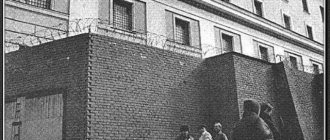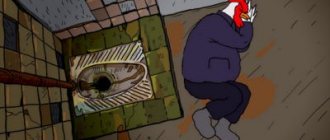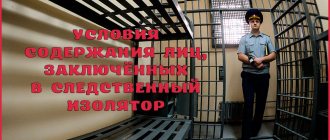Since Part 1 of Article 117 of the Penal Code of the Russian Federation looks somewhat vague due to its saturation with general phrases, penal system officers impose completely different penalties for the same type of offense.
Therefore, recently, more and more often, strict penalties are subjectively applied to prisoners and regimes are strengthened, guided not by current legislation, but by personal relationships.
Thus, the lack of specific legal grounds for placing a person in solitary confinement (in a PKT, a punishment cell, an EPKT) has resulted in a problem that requires elaboration.
What is PCT and PCT? Let's look at it in this article.
What is SUS in prison?
Judging by the way the SUS is deciphered in prison, one can understand that there is little that is pleasant about keeping prisoners in this way. It is applied to prisoners only for repeated violations of the regime, reprimands or fines. The purpose of SUS in prison and in the zone is to increase discipline. Malicious violators of the regime are transferred by order of the head of the prison or penal colony from regular cells to cells in PKT, EPKT or a punishment cell. These are special closed premises.
Strict conditions of detention in prison are regulated by Article 121 of the Criminal Executive Code of the Russian Federation. Those to whom they are assigned are deprived of the right to parole. This measure of punishment provides for limiting the number of visits of prisoners from 6 short-term and 6 long-term to 3 of both. A strict regime in prison means, first of all, harsh conditions in the cell and significant restrictions on freedom.
Thus, Article 118 of the Criminal Executive Code of the Russian Federation determines the procedure for prisoners receiving packages and parcels in such closed cells. For example, the SUS is only entitled to 1 transfer and 1 parcel once every six months.
Unlike ordinary prisoners, prisoners who have received severe punishment are deprived of the right to spend food and other goods worth more than 9 thousand rubles a month on purchases in stalls operating on the territory of closed institutions. For other inmates, there are no restrictions on spending money. Daily walks for inmates placed in a closed cell cannot exceed 1.5 hours. With good behavior, this time can be increased by the administration to 3 hours.
There are some relaxations in the SUS in the area for HIV -infected people. Despite their placement in PKT, EPKT or a punishment cell, they retain the right to receive an increased ration rate. According to Article 18 of the Criminal Code of the Russian Federation, such prisoners must be provided with the necessary medications and treatment. They go on all walks only when accompanied by an escort.
Why can such a regime be applied?
Formally, punishment must be applied for any violation of the regime in a penitentiary institution, but for minor violations, convicts are not placed in susu.
This type of punishment may be applied in the following cases:
- Consumption of alcohol, drugs, psychotropic drugs.
- Hooliganism.
- Disobedience to correctional colony employees.
- Organizing or participating in protests, riots, escapes and similar violations.
- Refusal to perform work duties.
- Using items that are prohibited in the colony. For example, bladed weapons, mobile phones, medicines.
But, if the convicted person commits another crime, a criminal case will be opened, which will then be sent to court and another punishment will be imposed. For example, they can increase the period of stay in a colony or transfer the convict to another, more strict regime.
Have a question for a lawyer? Ask now, call and get a free consultation from leading lawyers in your city. We will answer your questions quickly and try to help with your specific case.
Telephone in Moscow and the Moscow region: +7
Phone in St. Petersburg and Leningrad region: +7
Free hotline throughout Russia: 8 (800) 301-39-20
Strict conditions of detention in PKT or EPKT - what are the differences?
Each ITK (correctional labor colony or camp) has PKT (cell-type premises). It serves as the colony's internal prison. Since 1997, EPKT (single cell-type premises) began to be used to hold persistent violators of the regime. They are located outside the colony and are a structural unit of the regional department for the execution of punishments.
When prisoners are placed in the FCT, the postal address of the place where they are serving their sentence imposed by the court does not change. When punished in the form of EPKT, persistent violators of the regime are transferred to another city, and sometimes to a neighboring region. They change the postal address of the place where they are serving their sentence.
Compared to the punishment cell, PKT and EPKT have a more lenient regime for keeping prisoners. It depends on the administration of the closed institution how long the SUS will be assigned to the prisoner for his offenses. The maximum period of detention in the PCT, limited by current legislation:
- up to 6 months for men;
- up to 3 months for women.
Prisoners can be kept in the EPCT for no more than 1 year.
Peculiarities of keeping convicts in the EPCT
Punishment in the form of placing the convicted person in the EPKT for a period of up to 1 year is imposed by a decision of the head of the correctional institution or the person who replaces him.
What is a single chamber-type room? Practice shows that the conditions of detention of prisoners in the EPKT are similar to the conditions of a high-security prison.
What is a convicted person entitled to? Thus, persons who were transferred to single cell-type premises have the right to:
- within six months, receive only one parcel or parcel from relatives;
- spend money from your personal account every month to buy food and essential items only in the amount of 500 rubles;
- every day take a walk in the fresh air for an hour and a half. If the convicted person did not violate the established procedure for serving his sentence in a single cell-type room, then the head of the prison may decide to increase the walking time to 2 hours a day for a period of up to 1 month.
Are dates allowed in EPKT? With the permission of the prison administration, the convicted person can come for a short meeting with a relative for a whole six months.
A convict who has been transferred to the EPKT is not allowed to bring any of his belongings except the following:
- products;
- toilet soap;
- personal towel;
- Toothbrush;
- tooth powder, paste;
- cigarettes and matches;
- women are allowed to take necessary hygiene items;
- toilet paper;
- publications on religious topics.
In addition, such persons are allowed to take with them into a single cell-type room:
- documents with the results of consideration of his statements of complaints or other proposals;
- the court's decision in their case;
- a simple pencil;
- notebook;
- writing pens;
- postal envelopes, stamps and postcards;
- various literature from the library of the correctional institution;
- subscribed magazines, newspapers, books and other printed publications.
On the other hand, convicts who are studying at a school or college will not attend classes while serving their sentence. However, they are allowed to take textbooks with them, study independently and even consult with teachers.
Such convicts take food directly in their cell, and during work - at the workplace. In a single cell-type room, convicts are provided with bed linen only for the night's sleep.
To go outside the building, convicts are given a set of clothes that corresponds to the season.
At the request of prisoners in the EPCT, various clergy (at the choice of the convicted person) who represent legally registered religious organizations can be invited to them.
Prisoners in the EPKT must work separately from other prisoners . In addition, medical examination and outpatient treatment of persons in EPCT must be carried out in a room specially equipped for this purpose.
Sick prisoners should be placed in different cells according to their illnesses.
If the convicted person was transferred from the EPKT to a hospital of the executive system, then in this case the period of his stay in such a medical institution should be counted towards the term of serving the sentence.
If the convicted person intentionally caused harm to his health or feigned illness, then the period of his stay in the hospital will not be counted towards the term of serving the sentence.
Thus, in 2022, cell-type premises (PKT) and single cell-type premises (EPKT) mean isolators in which convicts can be kept for up to six months (PKT) or up to a year (EPKT).
They differ in that the PCT works for convicts of one colony, and the EPCT - for convicts of an entire region (located on the territory of a colony).
The punishment cell is the most severe room
The most severe conditions of detention for persistent regime violators are created in the punishment cell. This is a punishment cell that is found in every prison. The conditions of detention there are regulated by Article 118 of the Criminal Code of the Russian Federation. Prisoners placed in a punishment cell are deprived of the right to telephone calls, visits, walks, parcels and parcels. They are prohibited from spending any amount on goods and food in prison stalls. At the same time, their prison rations have been reduced.
You are allowed to take a limited number of items with you into the punishment cell. These include a minimum set of personal hygiene products. The period of detention in a punishment cell cannot exceed 15 days. The cell in the punishment cell is very cramped. At 9 sq. meters can accommodate up to 8 prisoners. The cells are equipped with shelf-like bunks, without mattresses or blankets, and they rarely have windows.
The administration of closed institutions often creates additional inconvenience for prisoners in their cells. For example, small shelves that act as seats are attached to the bunks at an obtuse angle. This is done to make it uncomfortable for prisoners to sit. In exceptional cases, prisoners may be placed in solitary confinement without the right to communicate with anyone.
Consequences
If a prisoner is assigned to the SUS, he can count on daily two-hour walks. Since the local section of the SUON is isolated from the rest of the correctional colony, prisoners in strict conditions of detention are not taken to work.
The disadvantage of staying in the SUS is that the number of parcels received is limited. In addition, the violator of the regime is not allowed visits. Judging by the reviews, after a strict condition of detention, a prisoner may not expect to be released on parole (parole).
For minors
DIZO is a disciplinary isolation ward, a type of punishment cell, typical for educational colonies.
Unlike correctional institutions, juvenile citizens serve their sentences in educational institutions. According to Article 137 of the Penal Code of the Russian Federation, the conditions there are very similar to a punishment cell, but somewhat softened.
Article 137 of the Penal Code of the Russian Federation. The procedure for applying penalties to those sentenced to imprisonment in educational colonies
- Convicts placed in a disciplinary detention center are prohibited from long visits, telephone conversations, purchasing food and basic necessities, receiving parcels, packages and parcels, using board games and smoking. They have the right to enjoy a daily walk of two hours.
- All penalties may be applied to convicts placed in a disciplinary isolator, except for placement in a disciplinary isolator.
- For educational purposes or for medical reasons, the early release of a convicted person from a disciplinary detention center is permitted by order of the head of the educational colony or his deputy.
With the permission of the head of the correctional institution, short-term visits are allowed to a juvenile offender - but no more; parcels, parcels and telephone conversations are also prohibited.
The daily walk of prisoners in the pre-trial detention center is two hours. To continue their education, minors are allowed to have the necessary textbooks and notebooks in the detention center. But board games and cigarettes are not allowed in the DIZO.
In contrast to the maximum fifteen days in a punishment cell, you can only put the offender in a pre-trial detention center for ten days. But remember how harsh the prison authorities can be - after “resting” in a regular cell for a couple of days, the prisoner can again be sent to the isolation ward.
You can learn more about the nuances of keeping minors in educational colonies in a separate article.
Special room or barracks
PKT – stands for cell-type premises; it is used in correctional colonies, both general and strict regime. It is located directly on the territory of the colony, in contrast to the EPKT - a single cell-type room. This type of cell is already considered an independent penitentiary institution, and prisoners are sent there in stages.
Violators of the regulations are accommodated in PKT and EPKT with several people per room. The former name of the PKT was a high-security barracks, that is, BUR. In some colonies this name was retained as an unofficial name.
According to Article 118 of the Penal Code of the Russian Federation, residents of a cell room have the right to only one parcel and one parcel every six months . In one month, a prisoner in a PKT can spend only five thousand rubles from his account. One and a half hours a day is the duration of a walk for a person sentenced to PCT or EPCT. Sometimes the head of the colony can increase this time to three hours if the prisoner approximately complies with the internal rules of the correctional institution.
The furnishings of the PKT are modest - folding beds and benches, according to the number of inhabitants of the room, a table firmly attached to the floor, and a bathroom behind a meter-long partition. The walls are covered with a layer of light-colored plaster, and the floor has wooden flooring on top of concrete. Access to the window is blocked by a fine-mesh steel grille; heating radiators and lamps are located in niches fenced off with the same mesh.










